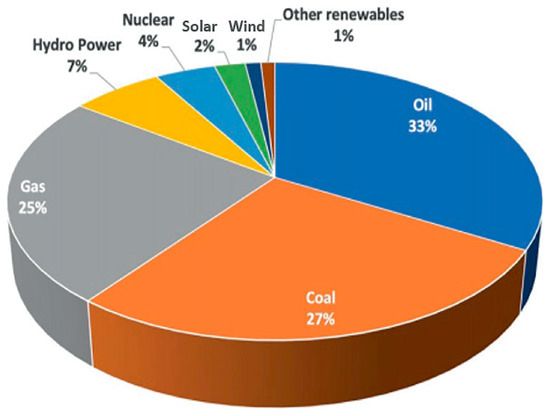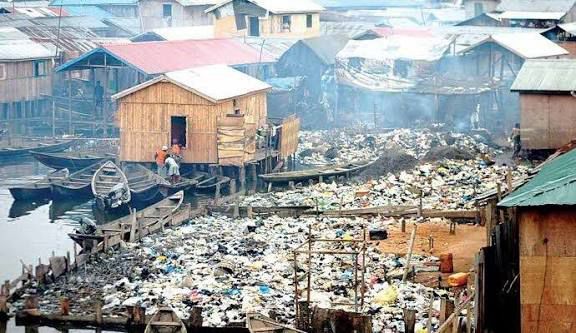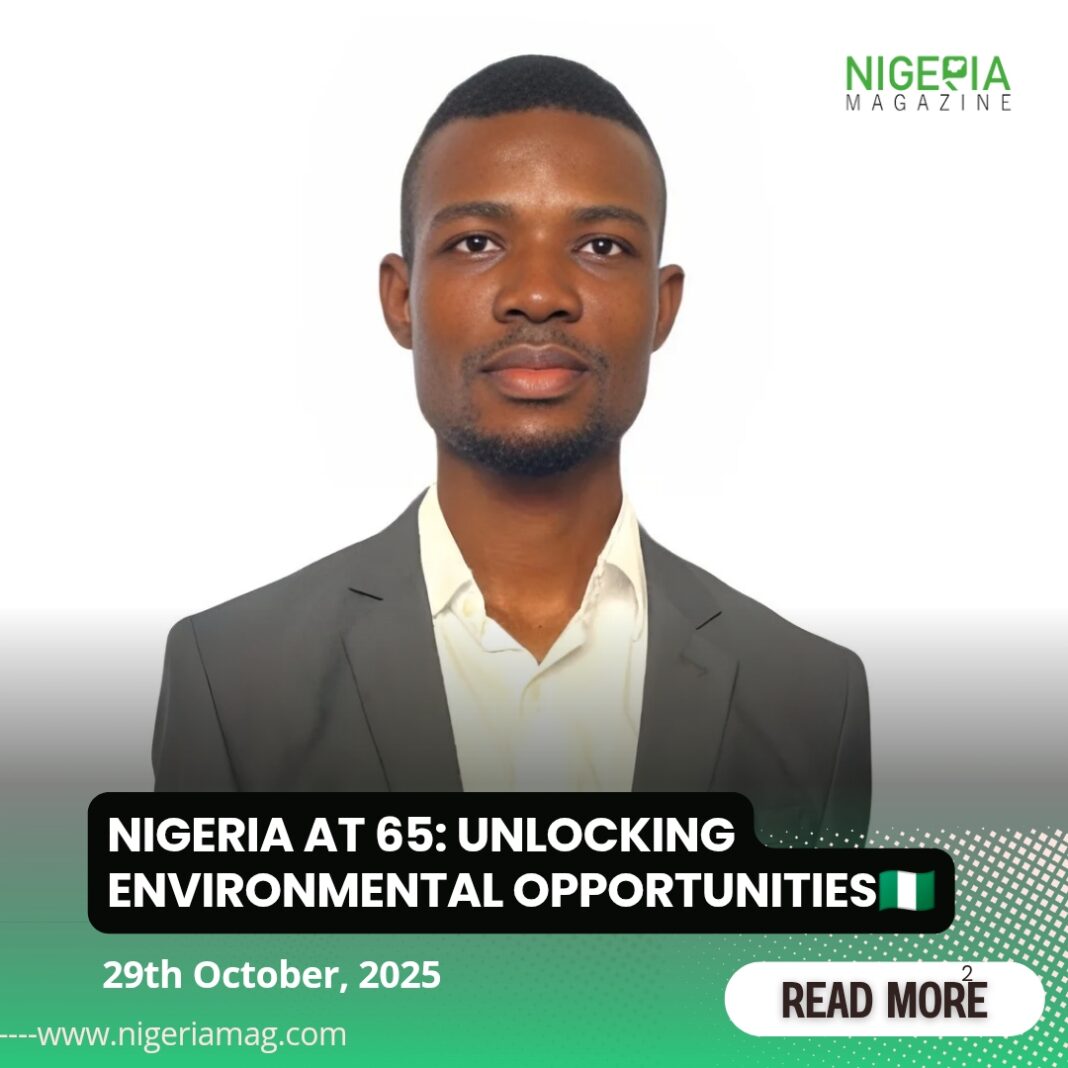By Ubong Usoro
At 65 years of independence (1 October 2025), Nigeria stands at a crossroads: rapid population growth, persistent development gaps and continued reliance on oil have produced deep environmental challenges, from deforestation and mangrove loss to widespread waste and gas flaring, but the country also has large, concrete opportunities to transform its economy through clean energy, nature-based solutions, circular economy approaches, green finance, and community-led restoration.
This article synthesises recent data and policy documents to do the following
(1) map the current environmental baseline,
(2) identify the highest-impact opportunities for green growth
(3) outline finance and policy levers
(4) propose an actionable short-/medium-/long-term implementation roadmap.
Key takeaways: Nigeria’s scale (over 230 million people in 2025) and large renewable resource base make a just green transition feasible and job-rich, but success needs stronger institutions, transparent finance, and quicker action to stop forest/mangrove loss and gas flaring.
Nigeria at 65: context and urgency
Nigeria became independent on 1 October 1960. As of 2025 the country is one of the world’s largest and fastest-growing populations (estimates ~234–238 million in 2025), with a large youth base and a rapidly urbanising society. This demographic scale magnifies both environmental pressures and the economic upside of green investment (jobs, services, resilience).

- Current environmental baseline (select, evidence-based facts)
Population & economy
- Population (mid-2025): ~234–238 million (UN/Worldometer estimates). Rapid population growth increases demand for energy, waste services, housing and food systems.
Energy & emissions
- Electricity access: Nigeria still faces large electricity deficits — over 80 million people (roughly a third of the population) lack reliablaccess to power; off-grid and mini-grid programmes have been a major focus of recent World Bank/NEP reforms.
- Emissions by sector (2019 baseline, excl. LULUCF): Energy 67%, Agriculture 20%, Waste -9.1%, Industry 3.1%. This distribution makes decarbonising power, transport and cooking the —highest-impact levers for emissions cuts. (Source: national pathway analysis / climate analytics).
Deforestation & mangroves
- Forest loss is significant and ongoing: Global Forest Watch records large recent tree-cover loss in Nigeria (hundreds of thousands of hectares in recent years), driven by agricultural expansion, fuelwood demand, charcoal production and development pressures. Nigeria has important coastal mangroves (largest in Africa), which are under threat from oil spills, pollution and conversion.
Oil sector impacts & gas flaring
- Oil remains central to government revenue; oil production rose in 2024–2025, but associated gas flaring remains a major emissions and local pollution source. The World Bank’s Global Gas Flaring Tracker showed increases in global flaring with Nigeria among countries with significant flaring volumes an urgent source of greenhouse gases and local air pollution.
Waste & urban services
- Lagos alone generates an estimated ~13,000 tonnes of solid waste per day; collection and treatment capacity remain far below need, creating public health and environmental hazards as well as lost economic value.
Pollution & legacy contamination
- UNEP’s Ogoniland assessment and follow-up indicate persistent oil contamination hotspots requiring long-term remediation (soil, groundwater, fisheries). Clean-up needs are both environmental and social justice issues for affected communities.
- Priority opportunity areas (how Nigeria can turn constraints into growth)

3.1 Renewable energy & decentralised electrification — fast wins and jobs
Why it matters: with high solar insolation across most regions and proven mini-grid/solar home-system (SHS) deployment models, renewable distributed energy can rapidly close access gaps and cut diesel generator use. World Bank-backed NEP and recent commercial deals (e.g., large mini-grid agreements) demonstrate scale-up potential. These programmes also create local green jobs (installation, maintenance, local manufacturing).
What to do:
Scale mini-grids and SHS via concessional grant windows and performance-based grants.
Fast-track grid-connection regulations and aggregator models so private DRE (distributed renewable energy) firms can operate commercially.
3.2 Nature-based solutions: mangroves, reforestation, REDD+
Why it matters: Nigeria’s mangroves provide coastal protection, fisheries support and blue carbon sequestration. Reforestation and REDD+ (results-based finance) can deliver emissions credits, jobs and watershed benefits. Nigeria has national REDD+ strategy foundations and recent large mangrove restoration projects in planning/early stages.
What to do:
Scale community-led mangrove restoration with MRV (measuring, reporting, verification) to access blue-carbon markets.
Link REDD+ actions to livelihood alternatives (charcoal alternatives, agroforestry) to reduce fuelwood drivers.
3.3 Waste & circular economy (waste-to-value)
Why it matters: urban waste is both a health hazard and an economic resource. Converting
municipal waste into compost, refuse-derived fuel, or feedstock for recycling creates jobs and reduces landfill/climate impacts. Lagos’s huge waste stream hides large value if collection and segregation improve.
What to do:
Invest in segregated collection, materials recovery facilities (MRFs) and incentives for private recyclers.
Pilot waste-to-energy where economically and environmentally justified, prioritising non-combustion technologies for plastics recycling.
3.4 Clean cooking, efficient transport and industrial efficiency
Why it matters: cookstoves and I transport are major local pollution and emissions drivers. Clean cooking and electrified/natural-gas-assisted cooking pathways can reduce deforestation and health burdens; e-mobility for urban buses and taxis reduces oil import bills and pollution.
3.5 Carbon finance, green bonds & blended finance
Why it matters: Nigeria has already issued sovereign green bonds and the market is growing, green bonds, blended finance, and carbon projects (REDD+, blue carbon) are practical ways to raise capital for large environmental projects. A sovereign green bond series in 2017 and recent larger issuances demonstrate investor appetite when transparency and reporting are robust.
- Case studies & recent projects (what’s already moving)
Nigeria Electrification Project (NEP) — World Bank/ESMAP support scaled solar mini-grids and SHS, connecting millions and creating thousands of jobs; NEP lessons show grants + private developers is a viable model.
Mangrove restoration pilots & large initiatives, community projects and planned large restorations in the Niger Delta aim to restore tens of thousands of hectares and open blue-carbon financing possibilities.
Gas flaring tracker & reform momentum — World Bank reports and national commitments place flaring reduction as a priority, with both regulatory and commercial levers available. Reducing flaring yields climate and local health benefits and can supply feedstock for domestic gas markets.
- Policy, institutional and financing levers
Policy & regulation
Integrate the Energy Transition Plan and Nationally Determined Contributions (NDCs) into sector budgets and procurement (power, transport, cooking). Nigeria’s ETP maps pathways to net-zero by 2060 and identifies sectoral job gains under a net-zero pathway.
Institutions & enforcement
Strengthen monitoring agencies (NESREA, REA, NUPRC) with legally backed MRV systems for emissions, forest cover and remediation progress (Ogoniland is an example where technical assessment must be matched by implementation funding).
Finance & markets
Leverage sovereign green bonds, blended finance vehicles, MDB concessional windows, and private-sector PURCHASE agreements (PPAs) for DRE. Expand green bond frameworks with clear verification to attract domestic pensions and international investors.
Community & private sector engagement
Condition finance on community benefit-sharing (jobs, fisheries support, agroforestry revenue) and transparent revenue flows to reduce conflict risks and ensure sustainability. REDD+/blue carbon schemes must allocate meaningful revenue to local communities.
- Roadmap: short (1–3 years), medium (3–7 years), long (7–15 years)
Short term (1–3 years) — “win and scale”
- Expand NEP mini-grid grants and fast-track 400 planned mini-grids (public-private MOUs already in place).
- Launch national mangrove restoration programme pilots with MRV and blue-carbon project registration.
- Issue transparent green bond tranches for pipeline projects with independent reporting.
Medium term (3–7 years) — “institutionalise & industrialise”
- Create value chains: local solar manufacturing, recycling SMEs, restoration nurseries, and green construction materials.
- Scale clean cooking transitions using LPG and modern biofuels where sustainable; connect to deforestation reduction strategies and social subsidies.
Long term (7–15 years) — “transformational outcomes”
- Energy system largely decarbonised (grid plus high penetration of distributed solar + storage).
- Measurable reductions in national flaring and established blue-carbon credits funding long-term coastal resilience.
- Risks, safeguards and monitoring
Risk: Greenwashing / poor MRV on carbon projects. Mitigation: International verification standards, community grievance mechanisms.
Risk: Displacement or loss of livelihoods from conservation. Mitigation: Conditional, transparent benefit-sharing and alternative livelihoods.
Risk: Reliance on oil revenues during transition. Mitigation: Use transition finance, sovereign green bonds and ring-fenced revenues for diversification.
- Ten recommended next actions (prioritised)
- Approve a 3-year rapid-scale plan for mini-grids and SHS with performance grants (NEP ramp-up).
- Launch a national mangrove restoration plan with blue-carbon MRV and community contracts.
- Issue a transparent sovereign green bond tranche tied to named projects with independent post-issuance reporting.
- Enforce flaring reductions via NUPRC timelines and mobilise gas-utilisation investments.
- Pilot city circular economy projects (Lagos: improved segregation + materials recovery).
- Fund Ogoniland-style remediation roll-out with PPPs and supervise long-term monitoring.
- Create green skills academies for installers, waste workers, restoration teams.
- Deepen REDD+ readiness and link to domestic green bond / donor results-based payments.
- Adopt clear, open MRV and public dashboards for emissions, reforestation and project finance.
- Build a blended-finance window to de-risk private investment into mini-grids and recycling plants.
- Annex — selected sources & further reading
Britannica — Independence Day (Nigeria).
World Bank / NEP & ESMAP — Expanding Nigeria’s mini grid market; Nigeria Electrification Project.
Climate Analytics / 1.5°C NDC Pathways — Nigeria emissions by sector.
Global Forest Watch — Deforestation and tree-cover loss in Nigeria.
UNEP — Ogoniland environmental assessment.
World Bank — Global Gas Flaring Tracker (2024/2025 reports).
Premium Times / scientific articles — Lagos waste statistics & studies.
Nigeria Energy Transition Plan (ETP) — national pathway and job estimates.
Debt Management Office / DMO & market reports — Nigeria green bond history and recent issuances.
Ubong Usoro
Ubong Usoro is a writer, environmentalist, media and communication specialist, and public affairs analyst. Born in Itu LGA, Akwa Ibom State, he holds a B.Sc. (Ed) in Geography Education from the University of Uyo, a Diploma in Biblical Studies from the School of Preaching, Nigerian Christian Institute, and has earned several certifications, including Microsoft and Climate Change courses.
He is a staff member of Nigeria Magazine and was recently celebrated as one of the winners of the Media Spotlight Awards held in Abuja for his story on the impact of climate change in Lugbe, Abuja.
An experienced broadcaster, Ubong has worked as a Station Manager at Truth and Life Radio, Abuja, Senior Presenter, Housing TV, 165 StarTimes, Morning Show Co-host on Fad 93.1 FM, and Morning Show Host on UNIUYO 100.7 FM and Political Correspondent for Global Television, 365 on DSTV. He is the convener of the biggest students’ climate change conference in Nigeria and currently serves as the Educational Outreach Coordinator for the Biodiversity Preservation Centre.


